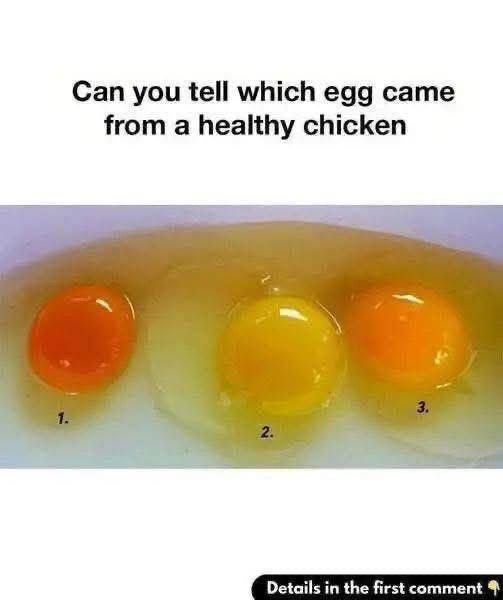
When selecting eggs, the health and care of the chicken that laid them play a crucial role in their quality.
Eggs from well-fed, well-treated chickens tend to be more flavorful, nutritious, and visually appealing. Here are six indicators that suggest an egg comes from a healthy chicken:
1. Rich Orange Yolk
What to Look For: A deep orange or golden yolk signifies a diet rich in carotenoids, derived from natural sources like grasses, flowers, and insects.
Why It Matters: Chickens that forage freely or receive a balanced, nutrient-rich diet produce eggs with vibrant yolks packed with vitamin D, omega-3 fatty acids, and antioxidants.
2. Thick, Gelatinous Egg White
What to Look For: A fresh egg’s white should be thick and slightly gel-like, rather than watery or thin.
Why It Matters: A strong, viscous albumen indicates freshness and high protein content, while a runny egg white may suggest an older egg or nutritional deficiencies in the chicken.
3. Sturdy, Well-Formed Shell
What to Look For: A firm, slightly textured shell that feels strong when gently squeezed.
Why It Matters: Chickens with sufficient calcium intake—often through natural supplements like crushed oyster shells—produce eggs with durable shells, reflecting overall good health.
4. Pleasant Aroma and Taste
What to Look For: A fresh egg should have a mild, clean smell and taste rich and creamy when cooked.
Why It Matters: Poor-quality eggs, particularly from factory-farmed chickens, may have an unpleasant odor or bland taste due to stress, poor diet, or overcrowding.
5. Minimal Imperfections or Blood Spots
What to Look For: While small blood spots are usually harmless, excessive irregularities may point to stress or inadequate care.
Why It Matters: Chickens raised in low-stress environments tend to produce eggs with fewer imperfections, indicating better overall well-being.
6. Ethical Farming Practices
What to Look For: Labels such as “pasture-raised,” “organic,” “free-range,” or “non-GMO,” or direct inquiries to farmers about their methods.
Why It Matters: Chickens raised with access to natural forage, space to roam, and a diverse diet are more likely to produce superior eggs. Supporting ethical farming benefits both your health and animal welfare.
Bonus Tip: Support Local Farmers
Locally sourced eggs, often found at farmers’ markets, tend to come from well-cared-for chickens. Speaking directly with farmers allows you to learn about their practices, ensuring transparency and promoting sustainable agriculture.
By keeping these factors in mind, you can choose eggs that support both your well-being and the ethical treatment of the animals that produce them.